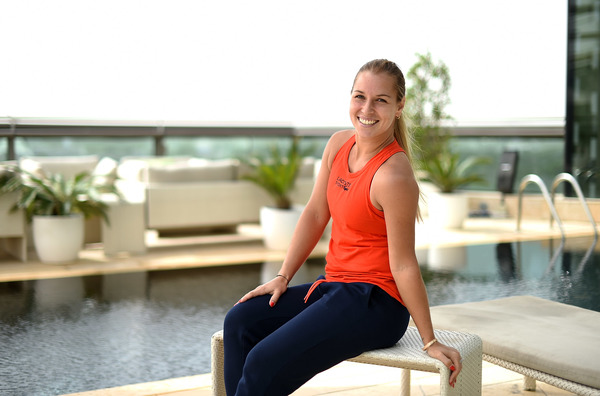News | WTA Tennis English
Dominika Cibulkova has long played David to a tour of Goliaths. The Slovakian dynamo found fertile soil early in her career and promptly began planting seeds; her garden is a veritable who’s who of the game’s biggest and brightest.
She rode that role right into a Singapore debut, where she broke new ground by winning the BNP Paribas WTA Finals Singapore presented by SC Global, stunning then-No.1 Angelique Kerber in the championship match.
Starting 2017 in full bloom therefore marks a colossal shift for Cibulkova, who is suddenly tasked with preventing the very chaos she once strived to create.

“I felt good in Australia but this is a new position for me, being World No.5,” she said during All-Access Hour at the Dubai Duty Free Tennis Championships. “I really have to work on myself every day, especially mentally.
“There are some players who come onto the court a bit differently against you. They have nothing to lose and want to beat you. This is something I’m really trying to adjust to, that and the expectations – not just my own, but also those of the people around me.”
Expectation undoubtedly bogged her down in Brisbane and Sydney, but it was after a run to the semifinals of the St. Petersburg Ladies Trophy that the wilting Slovak decided to reassess, stepping down from her perennial spot on the Fed Cup team.

“I got really negative on the court in St. Petersburg,” she said of her loss to Yulia Putintseva, “and that was my biggest disappointment from that match; maybe the expectation got too big for me.
“It’s good that I didn’t play Fed Cup so I could really have time to prepare for Doha. It helped me a lot and that’s why I played so well there. I’d always feel tired after a tie, but that’s something you have to accept if you decide to play Fed Cup. You have to know you won’t be completely ready for the next tournament.”
Cibulkova has been an absolute stalwart in national competition – playing a whopping 21 ties in 12 years – and admitted the annual decision to compete often adversely affected her schedule.
“It would be easier if the event could all take place at a reasonable date, but, for example, last week Slovakia played Italy on clay. That wouldn’t make sense for my schedule at all.
“Now that I’m older and more mature, I see that my career isn’t going to last forever. Right now, I feel like I can get my best ranking and reach my best results. I have to selfish.”

That desire for further introspection led her to step up her work with sports psychologist Radko Sevcík, who joined her team about two years ago and has been crucial to improving her big match mindset.
“I had my mental coach with me in Doha and we talked a lot about different things, how I should approach practices and matches, and how to be more positive on the court.”
The positivity paid off; Cibulkova reached the final four at the Qatar Total Open – the first of her career – and earned her 400th career match win in impressive style over an old nemesis.
“I felt good on the court. I beat Samantha Stosur, whom I’d never beaten before in my career. That gave me much more confidence, and even though I lost to Karolina Pliskova, it was a great match and I was really close to winning.
“After Doha, I feel like I’m playing really well.”
The first big test of that assertion will come early; Cibulkova will kick off Dubai campaign against Ekaterina Makarova, who won their most recent meeting at this year’s Australian Open.
All photos courtesy of Getty Images.


